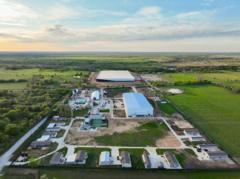Bastrop, Texas, is grappling with the economic promise and potential pitfalls of Musk's high-tech ventures, as the region balances growth with preservation.
**Elon Musk's Texas Ambitions: Bridging Innovation and Local Concerns**

**Elon Musk's Texas Ambitions: Bridging Innovation and Local Concerns**
Amid the transformation of rural Texas, Elon Musk's burgeoning corporate campus has ignited a spectrum of reactions from the local community.
Elon Musk's recent relocation from California to Texas has placed him at the helm of a significant corporate development in Bastrop, just thirty minutes from Austin. This transformation comes amid Musk's criticism of California's political climate and his quest for a more business-friendly environment. The sprawling corporate hub, which houses the headquarters of Musk's social media platform X, SpaceX facilities, and The Boring Company, is quickly reshaping the rural landscape.
Residents, however, have mixed feelings about this ambitious project. Sylvia Carrillo, Bastrop's city manager, articulates a community split; while job growth is welcomed, there is a palpable worry that a rapid influx of development could disrupt the area’s character and resources. She emphasizes that Bastrop is still dealing with the implications of Musk's presence, especially regarding housing prices and environmental sustainability.
Beyond corporate structures, the campus features amenities like Hyperloop Plaza, which contains a bar, coffee shop, and playground—elements aimed at forging a community atmosphere amid the tech boom. As Bastrop's population swells, the local economy is notably impacted. Real estate agent Judah Ross reports a significant uptick in housing demand as people flock to the area to work for Musk's companies, enhancing both economic prospects and community life.
Yet, some community members express skepticism towards Musk's management methods and environmental practices, especially following incidents of water pollution linked to The Boring Company. Despite these challenges, many locals share a balanced perspective, appreciating the technological advancements while remaining cautious about their potential repercussions. Alfonso Lopez, a resident, sums up the sentiment: as long as Musk's enterprises act as good neighbors, the benefits could outweigh the challenges.
Financially, Musk's companies stand to gain substantially, with recent applications for a free trade zone designation and state funding expected to yield thousands of jobs and capital investment. Still, these developments reveal a tension between immediate economic gain and long-term ecological and social impacts.
As local officials like Carrillo work to manage growth through regulations that protect green spaces and minimize overcrowding, the narrative around Musk in Bastrop continues to evolve. Many acknowledge the imperative to safeguard the town's historical essence while accommodating the inevitable changes brought by Musk's ventures. While public criticism remains muted, online sentiments reveal a more pointed apprehension about the ramifications of Musk's influence on the community’s future.
Residents, however, have mixed feelings about this ambitious project. Sylvia Carrillo, Bastrop's city manager, articulates a community split; while job growth is welcomed, there is a palpable worry that a rapid influx of development could disrupt the area’s character and resources. She emphasizes that Bastrop is still dealing with the implications of Musk's presence, especially regarding housing prices and environmental sustainability.
Beyond corporate structures, the campus features amenities like Hyperloop Plaza, which contains a bar, coffee shop, and playground—elements aimed at forging a community atmosphere amid the tech boom. As Bastrop's population swells, the local economy is notably impacted. Real estate agent Judah Ross reports a significant uptick in housing demand as people flock to the area to work for Musk's companies, enhancing both economic prospects and community life.
Yet, some community members express skepticism towards Musk's management methods and environmental practices, especially following incidents of water pollution linked to The Boring Company. Despite these challenges, many locals share a balanced perspective, appreciating the technological advancements while remaining cautious about their potential repercussions. Alfonso Lopez, a resident, sums up the sentiment: as long as Musk's enterprises act as good neighbors, the benefits could outweigh the challenges.
Financially, Musk's companies stand to gain substantially, with recent applications for a free trade zone designation and state funding expected to yield thousands of jobs and capital investment. Still, these developments reveal a tension between immediate economic gain and long-term ecological and social impacts.
As local officials like Carrillo work to manage growth through regulations that protect green spaces and minimize overcrowding, the narrative around Musk in Bastrop continues to evolve. Many acknowledge the imperative to safeguard the town's historical essence while accommodating the inevitable changes brought by Musk's ventures. While public criticism remains muted, online sentiments reveal a more pointed apprehension about the ramifications of Musk's influence on the community’s future.


















